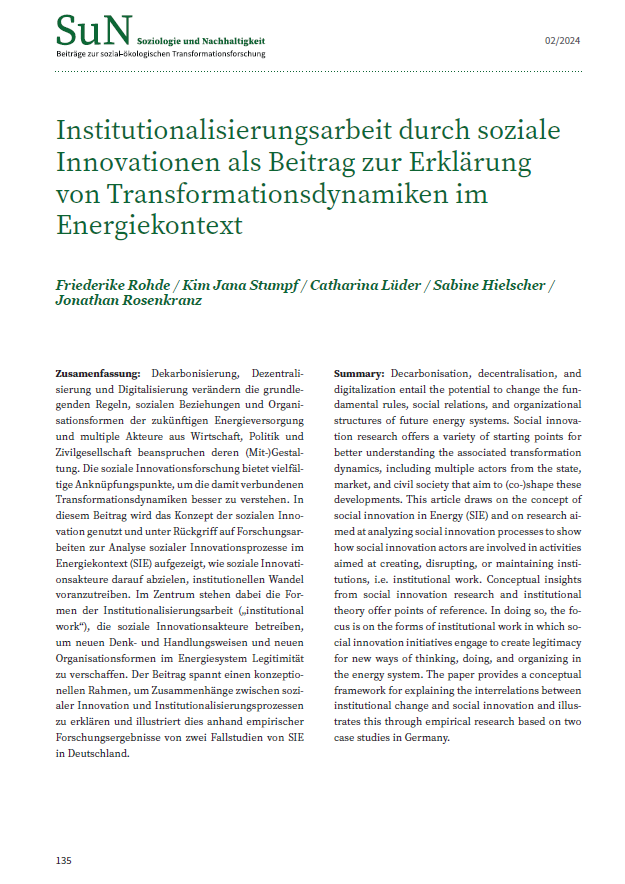Institutionalisierungsarbeit durch soziale Innovationen als Beitrag zur Erklärung von Transformationsdynamiken im Energiekontext
DOI:
https://doi.org/10.17879/sun-2024-6164Schlagworte:
Soziale Innovation, Energiewende, institutioneller Wandel, Institutionalisierungsarbeit, sozio-materielle RelationenAbstract
Dekarbonisierung, Dezentralisierung und Digitalisierung verändern die grundlegenden Regeln, sozialen Beziehungen und Organisationsformen der zukünftigen Energieversorgung und multiple Akteure aus Wirtschaft, Politik und Zivilgesellschaft beanspruchen deren (Mit-)Gestaltung. Die soziale Innovationsforschung bietet vielfältige Anknüpfungspunkte, um die damit verbundenen Transformationsdynamiken besser zu verstehen. In diesem Beitrag wird das Konzept der sozialen Innovation genutzt und unter Rückgriff auf Forschungsarbeiten zur Analyse sozialer Innovationsprozesse im Energiekontext (SIE) aufgezeigt, wie soziale Innovationsakteure darauf abzielen, institutionellen Wandel voranzutreiben. Im Zentrum stehen dabei die Formen der Institutionalisierungsarbeit („institutional work“), die soziale Innovationsakteure betreiben, um neuen Denk- und Handlungsweisen und neuen Organisationsformen im Energiesystem Legitimität zu verschaffen. Der Beitrag spannt einen konzeptionellen Rahmen, um Zusammenhänge zwischen sozialer Innovation und Institutionalisierungsprozessen zu erklären und illustriert dies anhand empirischer Forschungsergebnisse von zwei Fallstudien von SIE in Deutschland. Institutionalisierungsarbeit durch soziale Innovationen als Beitrag zur Erklärung von Transformationsdynamiken im Energiekontext
Decarbonisation, decentralisation, and digitalization entail the potential to change the fundamental rules, social relations, and organizational structures of future energy systems. Social innovation research offers a variety of starting points for better understanding the associated transformation dynamics, including multiple actors from the state, market, and civil society that aim to (co-)shape these developments. This article draws on the concept of social innovation in Energy (SIE) and on research aimed at analyzing social innovation processes to show how social innovation actors are involved in activities aimed at creating, disrupting, or maintaining institutions, i.e. institutional work. Conceptual insights from social innovation research and institutional theory offer points of reference. In doing so, the focus is on the forms of institutional work in which social innovation initiatives engage to create legitimacy for new ways of thinking, doing, and organizing in the energy system. The paper provides a conceptual framework for explaining the interrelations between institutional change and social innovation and illustrates this through empirical research based on two case studies in Germany.
(peer reviewed)

Downloads
Veröffentlicht
Zitationsvorschlag
Ausgabe
Rubrik
Lizenz
Copyright (c) 2024 Friederike Rohde, Kim Jana Stumpf, Catharina Lüder, Sabine Hieschler, Jonathan Rosenkranz

Dieses Werk steht unter der Lizenz Creative Commons Namensnennung 4.0 International.




